| Listing 1 - 9 of 9 |
Sort by
|
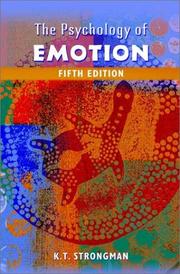
ISBN: 0471485683 0471485675 Year: 2003 Publisher: Chichester Wiley
Abstract | Keywords | Export | Availability | Bookmark
 Loading...
Loading...Choose an application
- Reference Manager
- EndNote
- RefWorks (Direct export to RefWorks)
Philosophical anthropology --- Affective and dynamic functions --- Emotions --- #KVHB:Emoties --- Feelings --- Human emotions --- Passions --- Psychology --- Affect (Psychology) --- Affective neuroscience --- Apathy --- Pathognomy
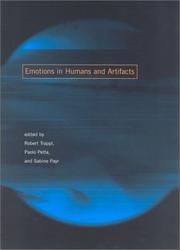
ISBN: 0262201429 0262285134 0585481237 9780262285131 9780262201421 9780585481234 Year: 2002 Publisher: Cambridge, Mass. MIT Press
Abstract | Keywords | Export | Availability | Bookmark
 Loading...
Loading...Choose an application
- Reference Manager
- EndNote
- RefWorks (Direct export to RefWorks)
Emotions as seen, analyzed, and modelled by scientists, artists, philosophers, and engineers.Emotions have been much studied and discussed in recent years. Most books, however, treat only one aspect of emotions, such as emotions and the brain, emotions and well-being, or emotions and computer agents. This interdisciplinary book presents recent work on emotions in neuroscience, cognitive science, philosophy, computer science, artificial intelligence, and software and game development. The book discusses the components of human emotion and how they might be incorporated into machines, whether artificial agents should convey emotional responses to human users and how such responses could be made believable, and whether agents should accept and interpret the emotions of users without displaying emotions of their own. It also covers the evolution and brain architecture of emotions, offers vocabularies and classifications for defining emotions, and examines emotions in relation to machines, games, virtual worlds, and music.
Emotions --- Social Sciences --- Psychology --- Physiological aspects --- Computer simulation --- Feelings --- Human emotions --- Passions --- Affect (Psychology) --- Affective neuroscience --- Apathy --- Pathognomy --- COGNITIVE SCIENCES/General
Book
ISBN: 907058221X Year: 1986 Publisher: Haren Sassenhein
Abstract | Keywords | Export | Availability | Bookmark
 Loading...
Loading...Choose an application
- Reference Manager
- EndNote
- RefWorks (Direct export to RefWorks)
Emotions in children --- Educational psychology --- Emotions --- #PBIB:1999.2 --- Feelings --- Human emotions --- Passions --- Psychology --- Affect (Psychology) --- Affective neuroscience --- Apathy --- Pathognomy --- Education --- Psychology, Educational --- Child psychology --- Educational psychology. --- Emotions in children. --- Emotions. --- Pedagogiek en onderwijskunde --- gezinspedagogiek --- gezinspedagogiek.
Book
ISBN: 9789028940581 9028940588 9077070796 Year: 2007 Publisher: Kapellen Pelckmans
Abstract | Keywords | Export | Availability | Bookmark
 Loading...
Loading...Choose an application
- Reference Manager
- EndNote
- RefWorks (Direct export to RefWorks)
165.195 --- 165.195 Soorten van kennis: emoties --- Soorten van kennis: emoties --- Emoties (Filosofie) --- Emotions --- Emotions (Philosophy) --- Philosophy --- Feelings --- Human emotions --- Passions --- Psychology --- Affect (Psychology) --- Affective neuroscience --- Apathy --- Pathognomy --- Philosophical anthropology --- History
Book
ISBN: 9780198802648 0198802641 0191840947 0192523651 Year: 2018 Publisher: Oxford Oxford University Press
Abstract | Keywords | Export | Availability | Bookmark
 Loading...
Loading...Choose an application
- Reference Manager
- EndNote
- RefWorks (Direct export to RefWorks)
A work about the ways in which humans have been bound affectively to the material world in and over time; how they have made, commissioned, and used objects to facilitate their emotional lives; how they felt about their things; and the ways certain things from the past continue to make people feel today.--
History of civilization --- Emotions --- Emotions. --- Europe --- Material culture --- Material culture. --- History. --- History --- Europe. --- Feelings --- Human emotions --- Passions --- Psychology --- Affect (Psychology) --- Affective neuroscience --- Apathy --- Pathognomy --- Culture --- Folklore --- Technology --- Culture matérielle --- Émotions --- Histoire. --- Histoire --- Gay culture Europe --- Culture matérielle --- Émotions
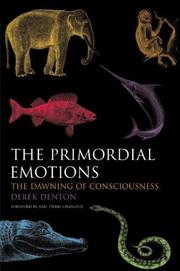
ISBN: 0199203148 9780199203147 Year: 2006 Publisher: Oxford Oxford university
Abstract | Keywords | Export | Availability | Bookmark
 Loading...
Loading...Choose an application
- Reference Manager
- EndNote
- RefWorks (Direct export to RefWorks)
Consciousness --- Emotions --- Mind and body --- Feelings --- Human emotions --- Passions --- Psychology --- Affect (Psychology) --- Affective neuroscience --- Apathy --- Pathognomy --- Apperception --- Perception --- Philosophy --- Spirit --- Self --- Body and mind --- Body and soul (Philosophy) --- Human body --- Mind --- Mind-body connection --- Mind-body relations --- Mind-cure --- Somatopsychics --- Brain --- Dualism --- Philosophical anthropology --- Holistic medicine --- Mental healing --- Parousia (Philosophy) --- Phrenology --- Psychophysiology --- Psychological aspects
Book
ISBN: 9060014758 Year: 1978 Publisher: Deventer Van Loghum Slaterus
Abstract | Keywords | Export | Availability | Bookmark
 Loading...
Loading...Choose an application
- Reference Manager
- EndNote
- RefWorks (Direct export to RefWorks)
Cognitive psychology --- Psychiatry --- psychologie --- psychofysiologie --- Biofeedback, Psychology --- Emotions --- Learning, Psychology of --- #GSDBP --- Learning --- Psychology of learning --- Educational psychology --- Comprehension --- Learning ability --- Feelings --- Human emotions --- Passions --- Psychology --- Affect (Psychology) --- Affective neuroscience --- Apathy --- Pathognomy --- physiology. --- Psychological aspects --- Biofeedback training. --- Emotions. --- Learning, Psychology of. --- BIOFEEDBACK (PSYCHOLOGY) --- physiology --- Biofeedback (psychology) --- Learning, psychology of. --- Physiology. --- Biofeedback training --- Visceral learning --- Biological control systems --- Feedback (Psychology) --- Mind and body --- Operant conditioning --- Psychotherapy
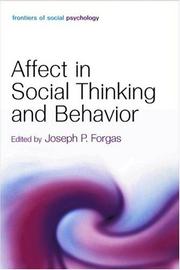
ISBN: 9781841694542 1841694541 9780203720752 9781135845162 9781135845230 9781135845308 9781138006225 Year: 2006 Publisher: New York Psychology press
Abstract | Keywords | Export | Availability | Bookmark
 Loading...
Loading...Choose an application
- Reference Manager
- EndNote
- RefWorks (Direct export to RefWorks)
Affect (Psychology) --- Emotions --- Interpersonal relations --- Social interaction --- Social perception --- Cognition, Social --- Interpersonal perception --- Social cognition --- Perception --- Social cognitive theory --- Human interaction --- Interaction, Social --- Symbolic interaction --- Exchange theory (Sociology) --- Psychology --- Social psychology --- Human relations --- Interpersonal relationships --- Personal relations --- Relations, Interpersonal --- Relationships, Interpersonal --- Social behavior --- Object relations (Psychoanalysis) --- Feelings --- Human emotions --- Passions --- Affective neuroscience --- Apathy --- Pathognomy --- Interpersonal relations. --- Social interaction. --- Emotions. --- Social perception. --- Relations humaines --- Interaction sociale --- Affect (Psychologie) --- Perception sociale
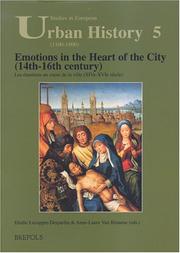
ISBN: 2503516181 9782503516189 9782503538815 Year: 2005 Volume: 5 Publisher: Turnhout Brepols
Abstract | Keywords | Export | Availability | Bookmark
 Loading...
Loading...Choose an application
- Reference Manager
- EndNote
- RefWorks (Direct export to RefWorks)
Whoever is curious about emotions and their expression in the Old Regime has to discover Johan Huizinga’s works. From his point of view, even if it is a real challenge to comprehend the world of the mind and of the sentimental life, historians of medieval and early modern societies cannot help themselves from examining character studies to reconcile daily life and historicity. Anglo-Saxon studies have proved since the beginning of the seventies that we can give historical meaning to fierce emotions like anger and fear, to mental suffering characterized by tears and pain, or even to the sudden feeling of aesthetic pleasure, mystical ecstasy and delight… all those emotions which put the breath of life into anonymous people crowded into our historical studies. Outside the debates of psycho-history, our study views the topic of emotions from the angle of social construction and civilization’s process.The town reveals itself as an ideal context within which to articulate values, mentalities, customs and aesthetics. From the marketplace to the court of justice, from the procession route to the scaffold, from the theatre stage to the scene of riots, the town concentrates in its heart a public space where both delicate and strong emotions are repeatedly enacted. The purpose of this book is to develop different approaches —according to sphere, events, social categories, social relations, gender, etc.— and thus to suggest a more precise analysis of emotion as a means of communication inside the town. Three urban social «spheres» where divergent emotions were publicly expressed, manipulated, discussed and represented are put into focus: that of the urban revolt, that of the urban administration of justice and that of the staging of urban theatre and poetry.
Cities and towns --- Emotions --- History --- History as a science --- History of civilization --- anno 1400-1499 --- anno 1500-1599 --- anno 1300-1399 --- Emotions--History--To 1500 --- Cities and towns--Europe--History--To 1500 --- Cities and towns--Europe--History--16th century --- Europe --- Cities and towns, Medieval --- Villes médiévales --- Villes --- Histoire --- Feelings --- Human emotions --- Passions --- Psychology --- Affect (Psychology) --- Affective neuroscience --- Apathy --- Pathognomy --- Council of Europe countries --- Eastern Hemisphere --- Eurasia --- Congresses --- 476-1492 --- 1492-1517 --- History. --- Emotions - History - Congresses --- Cities and towns - Europe - Congresses --- Europe - History - 476-1492 - Congresses --- Europe - History - 1492-1517 - Congresses --- EMOTIONS --- PASSIONS (PHILOSOPHIE) --- VIOLENCE URBAINE --- VILLES --- EUROPE --- CONGRES --- HISTOIRE
| Listing 1 - 9 of 9 |
Sort by
|

 Search
Search Feedback
Feedback About UniCat
About UniCat  Help
Help News
News